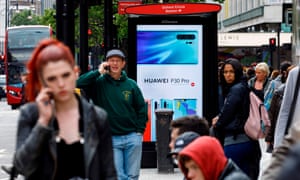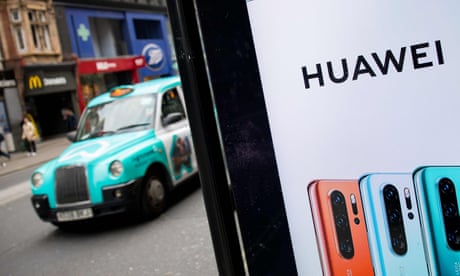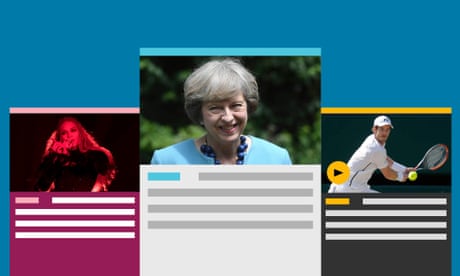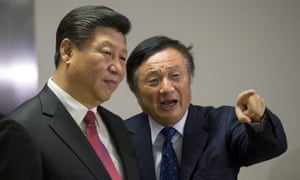Dan Sabbagh
 Huawei should be completely banned from supplying 5G mobile networks in the UK because its operations are “subject to influence by the Chinese state”, according to a report by a Conservative MP and two academics.
Huawei should be completely banned from supplying 5G mobile networks in the UK because its operations are “subject to influence by the Chinese state”, according to a report by a Conservative MP and two academics.
They argue that a decision announced by Theresa May last month, after a fraught meeting of the National Security Council (NSC), to allow Huawei to supply “non-core” equipment should be overturned because using the company’s technology presents “risks”.
In a report from the Henry Jackson Society (HJS), the authors claimed Huawei “has long been accused of espionage” – a claim denied repeatedly by the firm – and notes that “while there are no definitely proven cases”, a precautionary principle should be adopted.
Huawei 'prepared to sign no-spy agreement with UK government'
 The document is co-authored by the Tory MP Bob Seely, who has already raised concerns about Huawei, and the expert academics Peter Varnish and John Hemmings. It adds to pressure heaped on the British government to reconsider letting Huawei participate in the UK’s 5G network from the US and Australia, whose intelligence agencies share information with the UK.
The document is co-authored by the Tory MP Bob Seely, who has already raised concerns about Huawei, and the expert academics Peter Varnish and John Hemmings. It adds to pressure heaped on the British government to reconsider letting Huawei participate in the UK’s 5G network from the US and Australia, whose intelligence agencies share information with the UK.
Last month May provisionally approved the use of Huawei technology for parts of the UK’s future 5G telecoms networks after a meeting of the NSC. A leaked account of the meeting said five cabinet ministers raised concerns about the company.
The HJS report has a foreword by Sir Richard Dearlove, who led MI6 between 1999 and 2004. Using blunter language than the report’s authors, he wrote: “I very much hope there is time for the UK government … to reconsider the Huawei decision.
“No part of the Communist Chinese state is ultimately able to operate free of the control exercised by its Communist party leadership,” Dearlove added. “Therefore, we must conclude the engagement of Huawei presents a potential security risk to the UK.”
Huawei said it had never engaged in espionage or allowed its technology to be knowingly hacked by the Chinese state. Earlier this week, its chair, Liang Hua, said the company would be prepared to sign a “no-spy agreement”during a visit to the UK. Its founder, Ren Zhengfei, has said he would rather shut the company down than be ordered to conduct any surveillance on behalf of the Chinese state.
The HJS report notes countries such as the US and Australia have categorised Huawei as a “high-risk vendor”.
Donald Trump’s administration has declared a national emergency to ban technology from “foreign adversaries” and has subjected the Chinese telecommunications company to strict export controls.
Guardian Today: the headlines, the analysis, the debate - sent direct to you
 However, Peter Mandelson, a former EU trade commissioner and president of the Great Britain China Centre aimed at promoting dialogue between the two countries, accused the US of “fomenting hysteria” about Huawei “because [Trump] is driving a political and commercial agenda against China.”
However, Peter Mandelson, a former EU trade commissioner and president of the Great Britain China Centre aimed at promoting dialogue between the two countries, accused the US of “fomenting hysteria” about Huawei “because [Trump] is driving a political and commercial agenda against China.”
He added: “In the UK and Europe, we must maintain a proper sense of perspective and not allow ourselves to be dragged into President Trump’s attempt to build an economic and technological iron curtain around China. This is his fight, not ours, and we must not become part of it on spurious security grounds.”
Also the French president, Emmanuel Macron, commented on the issue on Thursday, saying his country was not aiming for a company boycott. He said “Our perspective is not to block Huawei or any company, it is to preserve our national security and European sovereignty. But I think launching now a technological war or a trade war … is not appropriate,”
But Malcolm Turnbull, the former prime minister of Australia, endorsed the HJS report, saying he had ordered a ban on Huawei in 5G networks because the risks of using its kit “cannot be effectively mitigated, you can’t design a way around it.”
British intelligence agencies have broadly argued the risks from using Huawei technology could be contained and an arm of the UK’s GCHQ has been monitoring and examining the company’s software and technology for back doors and vulnerabilities since the middle of the last decade.
No evidence of hacking has been made public, and the agencies are understood to have advised May and the NSA that any risks in using Huawei kit could be contained through a limited deployment.
However, five ministers raised concerns about the decision at the NSA meeting. One, Gavin Williamson, then the defence secretary, was fired by the prime minister for leaking details about the deliberations of the meeting, which prompted some Tory MPs to demand the UK decision be overturned.
 Ren Zhengfei, the founder of Huawei, right, pictured with the Chinese president, Xi Jinping. Photograph: Reuters
Ren Zhengfei, the founder of Huawei, right, pictured with the Chinese president, Xi Jinping. Photograph: Reuters
Meanwhile, the Dutch intelligence service is investigating whether Huawei is involved in espionage for the Chinese state in the Netherlands, the newspaper De Volkskrant reported on Thursday.
Citing intelligence sources, the paper said the general intelligence and security service (AIVD) was probing a possible hidden “back door” into customer data belonging to one of the Netherlands’ three major telecomms providers: VodafoneZiggo, T-Mobile/Tele2 or KPN.
The paper said the AIVD had declined to confirm or deny the information and the three networks either refused to comment or said they were not aware of the investigation. A Huawei spokesman told the paper the firm abided by the laws and regulations of every country in which it operates and protected customer privacy.
No comments:
Post a Comment